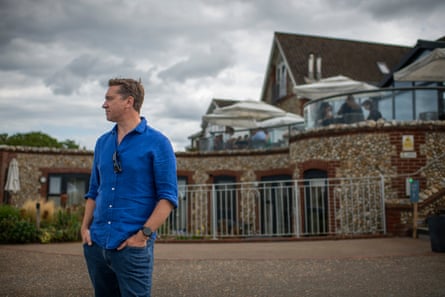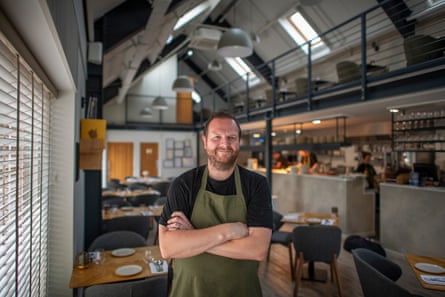On a sunny weekday in Norfolk, the lunchtime rush is getting under way at the White Horse in Brancaster Staithe. On the large terrace at the back of the pub overlooking the coast, families and groups of holidaymakers are tucking in to local lobsters, plates of crab and fish and chips.
“This is our Christmas,” says James Nye, the managing director of Anglian Country Inns, the hospitality business started by his father, Cliff, 30 years ago which owns the White Horse and nine other venues across Norfolk and Hertfordshire, stressing the importance of the key summer season.
“We’ve had a strong start to the year with three months of sunshine,” he says. “But I think that has masked the challenges the sector is facing. When the rain comes you can see how overheads have gone up.”
Nye reels off a list of soaring costs facing the White Horse that will resonate with pubs, cafes, restaurants and hotels across the UK, underlining additional pressures facing the sector this summer season.
“Since April we have had a lot of increase in overheads, pretty much across the board. We’ve got food price inflation, the big one is labour, with the NICs [employer national insurance contributions] and national minimum wage, and everything is getting more expensive,” he says.
Nye says his business, like many others, has been unable to absorb all the extra costs and passed some on to customers. But he and others are aware they have to tread a fine line at a time when many households are watching their spending.
Holidaymakers Brian and Ann Hart, visiting from neighbouring Suffolk, are enjoying a glass of prosecco while waiting to check in to their room at the White Horse. They have found accommodation and meals in North Norfolk “definitely more expensive” than during their last visit, says Brian.
“We would still come away, but maybe only a couple of times a year now because of the cost,” adds Ann.
Tax rises and extra employment costs announced in last October’s budget came into force in April, raising employer national insurance contributions (NICs) and lowering the threshold at which contributions are due. The minimum wage was also raised by 6.7% to £12.21 an hour.
These measures are ultimately expected to raise £25bn a year, which the government has said is needed to restore crumbling public services. However, the trade body UKHospitality, which represents thousands of restaurants, hotels, pubs, cafes and nightclubs, has warned the changes will cost the industry an extra £1bn, forcing some to cut jobs or slash investment, while others are struggling to stay afloat.
“This is the toughest trading environment I’ve ever experienced in 30 years in the sector,” says Kate Nicholls, the chair of UKHospitality, calling it even tougher than the pandemic.
“It is that perfect storm of soaring costs, a cost of living crisis happening at the same time, which means you can’t pass all of those costs on to customers, and a really intense squeeze on margins. Coming on the back of closures and losses during Covid, businesses are really lacking in resilience.”
Hospitality has shed 84,000 jobs since last October’s budget, according to figures from the Office for National Statistics (ONS), making it the worst affected sector. UKHospitality predicts this figure could hit 200,000 by the time the financial year ends in March 2026.
Meanwhile, warnings from the sector now appear to be becoming reality. The Italian casual dining chain Gusto and the Thai restaurant chain Busaba both collapsed into administration in recent days. Seven of Gusto’s 13 sites were bought in a pre-pack administration resulting in 200 job losses, while Busaba was also bought in a pre-pack deal, saving about 240 jobs at seven sites across London and Essex.
Nye also knows several pub operators who have had to call last orders for the final time, amid industry warnings that one pub will close down every day this year across Britain.
Anglian Country Inns employs about 100 people at the White Horse, a third of whom are seasonal staff, and a further 400 across the rest of the business. Nye says they have worked hard to retain staff by treating them well, but amid current pressures they are trying to make teams more efficient in a bid to cut costs. They have 5% fewer full-time staff than last year and have hired fewer seasonal workers than in the past.
after newsletter promotion
This reduction in seasonal hiring is being repeated across the sector, and job postings for temporary hospitality jobs are 25% lower than this time last year, according to figures from the Recruitment and Employment Confederation (REC).
The knock-on effect is a cut in job opportunities for students or those looking for flexible work, who have traditionally relied on hospitality jobs to get their first taste of employment.
It has resulted in a summer of disappointment and frustration for 19-year-old Jeremy Nunn from Hertfordshire, who planned to work in hospitality over the summer after finishing his first year studying history and French at the University of Leeds.
Despite sending off about 100 applications for seasonal roles, he still hasn’t found a job. “It’s a bit disheartening when you spend a lot of time on applications and then send them off online, it can feel like shouting into the void,” he says. “On most of my applications I’ve received nothing back.”
A few miles down the road from Brancaster in fashionable Burnham Market – nicknamed Chelsea-on-sea – the ice-cream van is doing a roaring trade and visitors are browsing in the town’s boutique and homeware shops.
The final customers are finishing their coffees and paying their bills after eating lunch at Socius, an award-winning restaurant known for its small plates featuring locally sourced produce, opened in 2018 by the husband and wife team of Dan and Natalie Lawrence.
Dan Lawrence says challenging times are forcing kitchens to get creative.
“We have to be smarter, cleverer and try to make better profit to cover those costs,” he says, sitting next to the counter where his staff are preparing ingredients for the evening’s dinner service. “We change our menu every week, sometimes throughout the week, so we have close conversations with suppliers and they tell us what’s good, what they’ve got plenty of, what’s a good price or what not to go anywhere near.”
Lawrence believes, like many others in hospitality, that the government could do more to help businesses struggling with high costs, such as the temporary reduction in value added tax (VAT) from 20% to 5% introduced by the then chancellor Rishi Sunak to kickstart hospitality after the first national Covid lockdown.
For now, Labour ministers have announced plans to “breathe new life into the high street” by overhauling planning and licensing rules, to make it easier for new hospitality venues to open in empty premises, as well making it easier for restaurants and pubs to get permission to allow customers to dine alfresco or enjoy a pint on the pavement.
While many in the industry would welcome such a move, others found it “galling” at a time of higher taxes and costs, says Jonathan Lawson, the chief executive of Butcombe Group, which runs 120 pubs and inns across the UK and Channel Islands, many of which are in rural locations.
“Most in the industry would say, because of the pain the government inflicted on the hospitality sector, why would new businesses choose to actually be starting up in some of those locations?” he asks.
Lawson says Butcombe Group has grown well since the pandemic, partly through diversifying its business, including opening its pubs earlier for breakfast, while promoting its venues as places for couples to celebrate their weddings.
“In hospitality, our job is to provide what customers want,” he says. “Hospitality is the third-highest employer in the UK, it can drive growth, it wants to invest. It’s almost in spite of the government, rather than because of it.”
Back in Norfolk, the sun is still shining, but Nye worries what will happen when the summer ends and the visitors leave. “Our big fear is what happens when trade dies down, when the season gets a bit quieter. Carrying those extra overheads is going to really hurt us,” he says.












